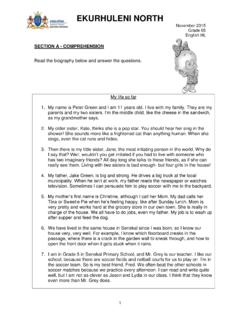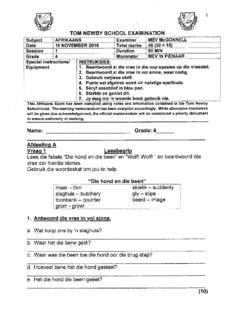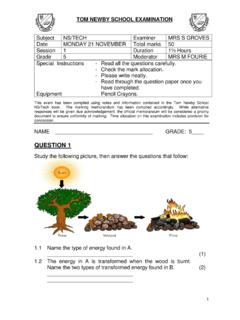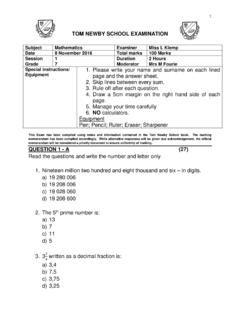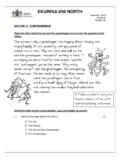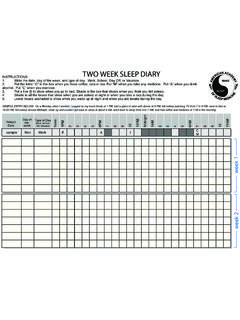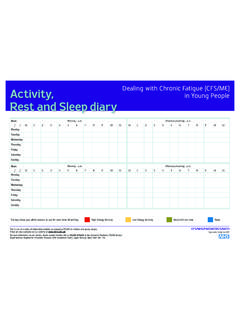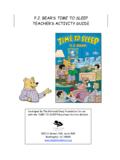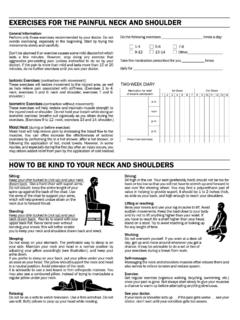Transcription of Life Skills - Grade 6 Personal and Social Well-being Term ...
1 1 Life Skills - Grade 6 Personal and Social Well-being Term 2 Module 5 Self-management Skills ( week 1-2) Unit 1: Managing Responsibilities (pg. 3 ) Unit 2: Tips for getting organised (pg. 7 ) Unit 3: Case Study (pg. 11) Module 6 Bullying ( week 3-4) Unit 1: What is bullying? (pg. 12) Unit 2: Reasons for bullying (pg. 13) Unit 3: Can bullies stop being bullies? (pg. 13) Unit 4: Reading about bullying (pg. 15) Module 7 Cultural Rites of Passage ( week 5-7) Unit 1: What is a rite of passage? (pg. 18) Unit 2: Rites of passage and specific cultures ( ) Unit 3: Reading about rites of passage ( ) Formal Assessment Formal examination ( week 8-9) Module 8 The dignity of the person in religions in South Africa ( week 10-11) Unit 1: Dignity and Religion (pg. 24) Unit 2: Codes of conduct in religion (pg. 25) 2 Here is a complicated definition of Self- management: Self-management refers to methods, Skills , and strategies by which individuals can effectively direct their own activities toward the achievement of objectives.
2 In groups of 2 or 3, discuss the definition given above. Find a way to write the definition in words that are easier to understand. Write your simplified definition on a sheet of A4 paper and paste it up on the classroom display board. Module 5 Self-Management Skills Introductory Activity 3 At home, and at school, there are things that you are responsible for. At home, your responsibilities might include things such as: keeping your room tidy, taking out the trash, cooking dinner, washing dishes, getting ready on time in the morning and making your bed. At school, your responsibilities might be activities such as: doing homework, studying for tests, going to sport practise, doing monitor duty, and so forth. Sometimes, it is very hard to manage all the things you need to do. Do you have a busy life? Do you struggle to fit all of your activities into the day? Are you constantly in a state of panic or do you think you are pretty well organised?
3 Which one of the following cupboards could be yours? Unit 1 Managing Responsibilities 4 Based on your understanding of self-management, how organised do you think you are? Do you plan how to complete your tasks and activities so that you have enough time to finish them well or do you leave things until the last minute or, sometimes, not get anything done at all. Most people are lukewarm organisers they are organised most of the time but sometimes they are lazy or don t plan well. Where do you fit on the scale of self-management? Complete the following Quiz to find out how organised you are: 1. You get home from school and you are starving. What do you do? a. Drop your case at the door and raid the fridge. b. Put your case in your bedroom, change into casual clothes and then grab a packet of crisps and a juice. c. Unpack your school books and get them ready for homework, change into casual clothes, feed the cat and then prepare a healthy sandwich.
4 2. It s time to do your homework. a. You check your diary to see what has to be done and tick each item off as you complete it. b. You realise that you haven t written your homework into your diary so you phone a friend to get the information. Then, you complete your homework. c. You turn on the TV and sit with your Science book in front of you for 20 minutes before you realise you don t have any Science homework. 3. It s time to get ready for school. a. You scramble around for clothes that aren t too creased and rush out of the door to get to school on time. Activity 5 b. You select clothes from your neatly packed cupboard and grab a quick breakfast bar as a snack to eat on the way to school. c. You put on the clothes that you selected the evening before and have enough time to sit at the kitchen table and calmly eat some cereal before leaving to go to school. 4. Your teacher says, Alright, everyone. It s time for the Maths test.
5 A. You say, Test? What Test? b. You remember there is a test but you didn t have enough time yesterday to study for it. c. You take a final look at your study notes and set your stationery out, ready for the test. 5. Without thinking too long about it, you know where your Maths Book is. a. Always b. Sometimes c. Not very often 6. You write your homework down accurately, in your diary. a. Sometimes b. Always c. Never 7. You use a daily or weekly schedule to list what activities you have to do. a. Sometimes b. Always c. Never 8. Your school bag is likely to contain: a. All of your books, a few crumpled newsletters that you forgot to give to your mother and some very old sandwiches. b. Only the books you need for the day and today s lunch. 6 c. A few comic books, a broken pen and some , and your kit from yesterday s practice. 9. Your school lunch usually consists of: a. Money for tuck. b. Junk food that is easy to pack quickly in the morning. c. A well balanced meal that was prepared the night before or early in the morning.
6 10. You have completed the goals and objectives section of your Homework Diary, for Term 2. a. Yes, I have. b. No, I have not. c. I have no idea that there is such a thing in my Diary. Score yourself using the following score sheet: 1. a=1 b=2 c=3 6. a=2 b=3 c=1 2. a=3 b=2 c=1 7. a=2 b=3 c=1 3. a=1 b=2 c=3 8. a=2 b=3 c=1 4. a=1 b=2 c=3 9. a=1 b=2 c=3 5. a=3 b=2 c=1 10. a=3 b=1 c=0 Have you got good self- management Skills ? Score 25-30: If you look the word 'organized' up in the dictionary, there will be a picture of YOU! You have a great system in place for keeping track of your stuff. Keep it up! Score 15-24: You're usually on time, usually prepared; usually get the picture! Good job. Keep it up and you'll be on your way to becoming a self-management superstar! Score 9-14: Uh-oh. Life s getting the best of you. Pay careful attention to the rest of this section of your Life Skills you need all the help you can if you want to be more organised.
7 7 Here are some tips on how to get your life organised and manage your time and activities effectively: General Organisation Organise your space. Throw away things you don t need, store things you don t use very often and give everything else a clearly designated area. Organising a space doesn't just mean getting it tidy. The purpose of organization is to be able to find, exchange, and evaluate items quickly. Observe how you use your things and work out how to use your space efficiently. If it's inconvenient to get to things (or to put them away), your organization system is more likely to fail. Put it back. Once you work out where everything belongs, you need to get into the habit of putting it back where it belongs. Don t put it on the bed, or on the kitchen table and think that you will pack it away probably won t. Always put your keys in the same place. Always put your cell phone in the same place set up a charging station.
8 Use a calendar. Get a calendar and put it in a place where you see it every day preferably in the morning. Make it part of your routine to refer to it every day. The bathroom mirror is a popular choice for displaying a calendar you can look at the day s duties and upcoming events while brushing your teeth. Use a planner or a daily diary. A planner or diary is especially useful if you have busy days with lots of appointments. A planner or diary should be easy to carry with you so that Unit 2 Tips for getting organised 8 you can look at it whenever you need to. Planners and diaries allow for more information than a calendar does. Write it down. A short pencil is always more effective than a long memory. Anything and everything you need to remember should be written down. Even if your memory is great, you can t possibly remember everything. Make list of things to do. Make a To Do List for the day it should never have more than 5 items or you won t get through it anyway.
9 Prioritise 2 of the items on your list and absolutely make an effort to complete them. You can also make a list of things to do for the week , month, year or your life (seriously consider the last one if you want to be successful as an adult!). Once you have created a things to do list , cross the items off as you complete them you will feel really proud of everything you have done when you see many things crossed off and completed. Carry a small notebook and pen set with you so that you can jot things down whenever you need to transfer them to the things to do list when you have time. Getting organised for school GOALS. Set realistic goals at the beginning of the school year, and break those large goals into mini-goals. Write these goals down on index cards and keep them in a highly visible place where you can see them every day. Writing down your goals makes them more concrete, and motivates you to keep working towards them.
10 DON T RUSH. Wake up early enough for school to arrive well ahead of time. If you need 30 minutes to get up, shower and dress, try waking up at least 45 minutes prior to your departure so that you don t have to rush. To ensure you don t turn off your alarm clock and go back to sleep, place your clock at the far end of your room. This way, you actually have to get out of bed to turn it off, and you re more likely to stay up. 9 PREPARE YOUR WARDROBE. Before you go to bed each night, choose, iron and lay out your clothes for the next day. This way, you ll be all set to dress and go in the morning. AVOID CLUTTER. At the beginning of the school year, you have no clutter. Be careful not to build clutter as the year progresses. Create separate folders for school announcements, tests that have been marked, papers you must give to your parents and so on. As papers become outdated, such as an event that has passed, throw them away. MAKE TO DO LISTS.
